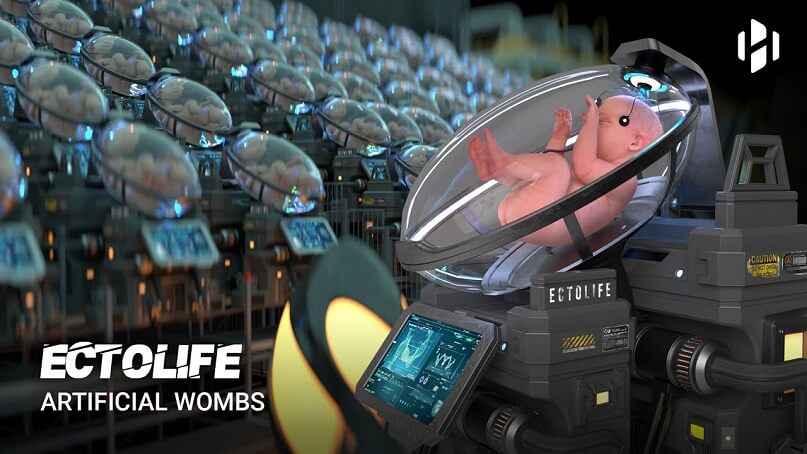By: Soul:Ask | Guest Post
It’s a novel idea you’d probably expect to see in a dystopian piece of sci-fi like The Matrix or Brave New World, but the concept of human “farms” filled with birthing chambers full of genetically engineered babies may become reality in a totally unprepared world.
The basic idea is that instead of a baby growing in the usual way in its mother’s womb for about nine months, the child will grow in one of the ‘artificial wombs’.
EctoLife is a concept invented by scientist Hashem Al-Ghaili, who created a video promoting the idea of birth chambers that would grow thousands of people outside the womb to spark a conversation.
The video stated that “premature births and caesarean sections will be a thing of the past and declared that the technology will help countries suffering from severe population decline.”
EctoLife claims that just one of its lab buildings can grow up to 30,000 babies each year, and the child inside will be monitored by all sorts of sensors, which will report back to the parents.
They will also allow parents-to-be to access an app that will allow them to watch a time-lapse of their baby’s development, along with playing music through speakers installed in the capsule.
EctoLife will also help you edit any of your baby’s traits that you like, including adjusting “baby’s eye colour, hair colour, skin tone, physical strength, height, and intelligence level.”
“And if you want your baby to stand out and have a bright future, our elite package offers you the chance to genetically engineer an embryo before implanting it in an artificial womb. With the CRISPR-Cas 9 Gene Editing Tool, you can edit any of your child’s traits with a wide range of over 300 genes. Genetically engineered, the elite gene kit package allows you to customize your child’s eye colour, hair colour, skin tone, physical strength, height, and intelligence level. It also allows you to correct any inherited genetic diseases that are part of your family history so that your child and their offspring live a healthy, comfortable life free of genetic diseases. Say goodbye to the pain of childbirth and the muscle contractions associated with childbirth.”
If this is going to be the future, it looks like a lot of people won’t be too happy, as there has been a backlash against the “creepy” idea.
There wasn’t much praise for the idea, though a handful suggested the project’s goals of helping low birth-rate nations and families struggling to conceive could be a boon.
Having babies in some kind of incubators is an evolutionary process that has been frayed in science fiction novels for a long time and eventually people will come to it. However, being remarkable so far only in theory, will only work in an ideal utopian society. Our modern society is infinitely far from utopia, and therefore the innovation will turn out to be a very terrible one.
The second problem in all this is no longer ethical, but technological. As Al-Ghaili said, people have been dealing with the topic of an artificial uterus for at least 50 years. During this time, progress is almost zero in molecular biology.
Today, human technology does not allow creating an artificial uterus in principle. It’s just as impossible as it was back in 1982 for Intel to jump from a 100,000 transistor processor to a 300,000 processor and then take giant strides further. And although many scientists discarded the hints of conspiracy theorists about the help of aliens, in 2021, the same researchers were not up to laughs when graphene crystals began to collect right in their feeble-minded brains.
The topic is the same with artificial wombs, so there was definitely some kind of help from outside. And as practice has shown, this help from outside does not lead to good results, nor good space humanitarians fly into orbit, but guys who act solely in their own interests. Therefore, it is unknown how this technological escalation will end.
* * *
READ MORE: Why The Matrix Was Designed For You To Escape
Read more on The Matrix Like Future: ‘A Glitch In The Matrix’ Documentary Explores The Dark Side of Simulation Theory
Enjoyed it? Please take a moment to show your support for Collective Spark.

